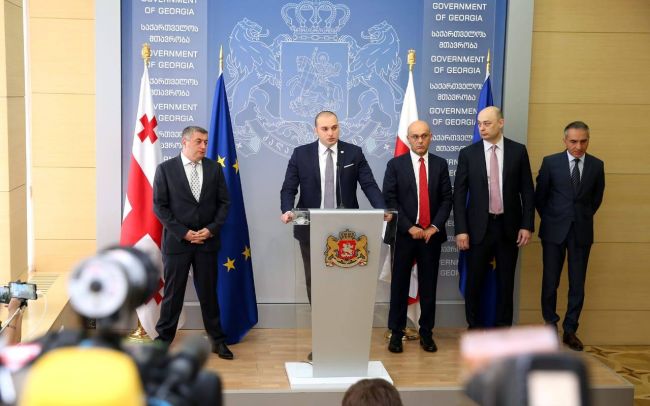Prime Minister Mamuka Bakhtadze presented his new cabinet composition on July 12, including three new ministerial candidates. Bakhtadze’s eleven-member cabinet will face the parliamentary vote of confidence on July 14, following the ministers’ meetings with parliamentary committees and political groups.
The cabinet newcomers are:
- Minister of Education, Science, Culture and Sport – Mikheil Batiashvili, Rector of the Business and Technology University in Tbilisi. Previously, Batiashvili served as the Dean of the Business School at Ilia State University and managed the Cartu Foundation’s Silicon Valley Tbilisi project;
- Minister of Finance – Ivane Machavariani, Chief Commercial Officer at Geocell mobile telecommunications operator from 2013. Machavariani joined Geocell in 1997, serving as its Chief Financial Officer in 2006-2012;
- Minister of Economy and Sustainable Development – Giorgi Kobulia, doctor by training and Senior Partner in McKinsey’s Moscow office. In 1994-1996, he served as a cardiologist at the Institute of Cardiology of Georgia, and in 1996-1999 as a Scientific Associate at Merk, Sharp & Dohne, an international pharmaceutical company.
“I am sure that this team will win the parliamentary confidence; it will pursue the interests of Georgia and its people and introduce high standards of modern governance – in the country that will be less bureaucratic, more efficient and flexible, and that will be based on the concept of small government,” PM Bakhtadze said at a press conference yesterday.
PM Bakhtadze also announced that Kakha Kakhishvili, Minister of Corrections, whose ministry was merged with the Justice Ministry in PM Bakhtadze’s recent structural changes, will become the new head of the Government’s administration. He held the ministerial position since August 2015.
Priorities of New Ministerial Candidates
The three candidates spoke briefly of their priorities at the press conference yesterday, with Giorgi Kobulia saying he would focus on regional and rural development, including through attracting investments in agriculture.
“We plan [to implement] serious measures in support of small and medium-sized businesses,” Kobulia noted, adding that he would also prioritize “industrialization and the tech-based economy.”
Ivane Machavariani stressed the importance of digitalization in the financial sector. He said the new cabinet’s small government concept will be “practically impossible” to implement without digitalization, since it also implies increasing bureaucratic efficiency, along with saving the government expenses.
Mikheil Batiashvili said comprehensive education reform would be his main priority. “Reforms will start in the shortest possible time and will aim at achieving quick results [in the short term] and at producing the human capital necessary for advancing our county in the long term,” Batiashvili explained.
Structural Changes
Bakhtadze announced the structural reform plan and staff changes shortly after his nomination, but since changes in government organization required lengthier legislative amendments process, the cabinet went through the confidence vote in its current arrangement, with acting ministers.
The Parliament approved the legislative amendments on July 5, enabling the Prime Minister to re-nominate the new cabinet composition to the legislature.
As a result of Bakhtadze’s structural changes, the number of ministries was reduced from fourteen to eleven. The ministries are:
- Ministry of Defense;
- Ministry of Economy and Sustainable Development;
- Ministry of Education, Science, Culture and Sport;
- Ministry of Environment Protection and Agriculture;
- Ministry of Finance;
- Ministry of Foreign Affairs;
- Ministry of Internal Affairs;
- Ministry of Internally Displaced Persons from the Occupied Territories, Labor, Health and Social Protection.
- Ministry of Justice;
- Ministry of Regional Development and Infrastructure;
- State Ministry for Reconciliation and Civic Equality.
Mamuka Bakhtadze, who served as Finance Minister since November 2017, was tapped to be the country’s new head of government after Prime Minister Giorgi Kvirikashvili stepped down on June 13, amid public protests, as well as apparent “differences of opinion” with the ruling party leadership.
This post is also available in: ქართული (Georgian) Русский (Russian)

